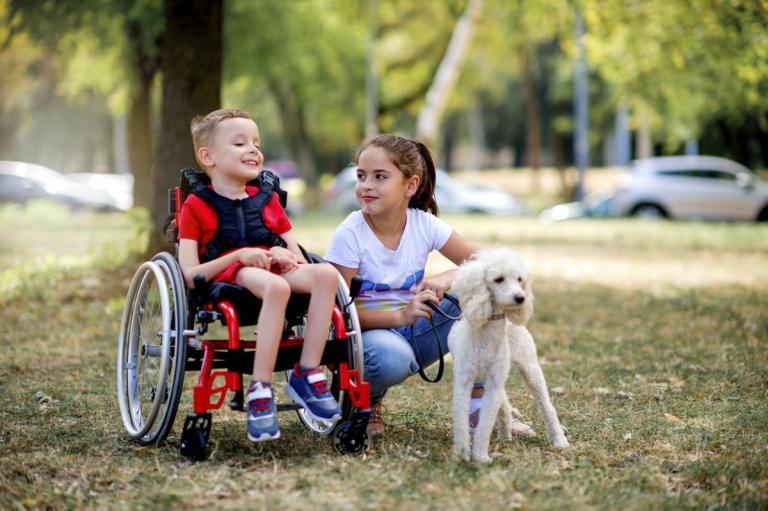12/3/21 blog post
embrace, expose, and empathize - discussing disabilities with your child
on International Day of Persons with Disabilities, remember the 3 e's to discuss disabilities with your child

December 3 is International Day of Persons with Disabilities. This day is for promoting the rights and well-being of people with disabilities and increasing awareness of people with disabilities in all aspects of life.
In the U.S., 1 in 4 adults lives with a disability. In 2017, about 1 in 6 children (17%) aged 3-17 were diagnosed with a developmental disability according to the CDC. So, it is likely that your child will come into contact with people who have disabilities. It is important to ensure that your children are mindful of how they treat others and are inclusive of all people. Today is the perfect day to start having these conversations in order to make our society more welcoming for people with disabilities.
Dayton Children’s pediatric psychologist Dr. Latisha Gathers-Hutchins says children should be encouraged to explore their curiosity about people with disabilities. Teaching children to be more inclusive, use inclusive language, and empathize with people who have differing abilities has a psychological effect on their being ready to engage with and accept others.
To encourage inclusivity, it is important to remember the three E’s with your child:
-
Embrace Curiosity.
Kids are going to ask questions. While it may be mortifying when they verbalize their curiosities about a person with a disability in a public setting, it is important to not give in to the natural inclination of hushing your child. Instead, acknowledge the child's curiosity and redirect the child to having the discussion later.
An example of this may look like:
“I see you’ve noticed that person is in a wheel-chair, we can talk about this when we get home.”
This creates an environment in which the child knows that it is okay to notice what makes people different, and that differences between people are not “bad,” or “wrong.”

-
Expose to Inclusivity
Creating an inclusive environment and teaching your children how to be more accepting can be influenced by what you expose your child to. Watching TV shows featuring people with differing abilities, reading books about people who are different and otherwise normalizing the experience can help a child to understand our diverse society.
Also remember to use matter-of-fact language when discussing people with disabilities with your children. Staying away from colloquialisms, metaphors, or other unclear language will help your child feel equipped to discuss and include others who are different from them.
Dr. Gathers-Hutchins gave an example of a first-grade class with a student who had autism. Prior to the student joining the class, the teacher shared books with the other students about how a child with autism may think, speak or act. As a result, the students were excited to play with, and include this student in their activities.

-
Introduce Empathy
Empathy is the idea of understanding that all people have differences. Teaching your children how to empathize with all people can help them understand and include those who may have differing abilities.
For younger children, empathy may be a harder concept to grasp. Try practicing empathy with your child while reading stories. Ask them what a story book character might be thinking or encourage them to guess what the character will do next. Hopefully, your child will soon start to learn how to put themselves in someone else’s shoes.
Gathers-Hutchins says, with her own children, she might say “this person has trouble with xx, just like sometimes you have trouble with xx. We are all different in many ways.”
She also emphasizes using “people first language” at all times when discussing those who may have differing abilities. Make sure that you do not label that person as their disability. For example, it is important to say, “this person has autism,” instead of “an autistic person.”

Dayton Children’s is committed to striving for an environment in which all people feel welcomed, valued and fairly treated in order to reach our full potential. Share with us how you and your family are promoting inclusivity in your community or how a more inclusive community has impacted your day-to-day life.

